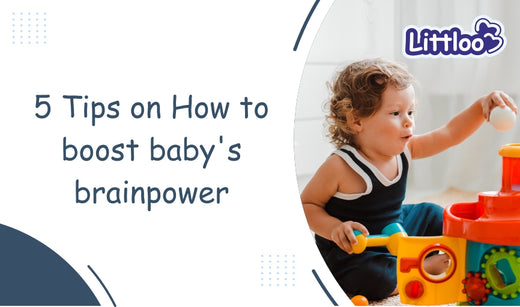Do you know about an interesting fact- Your baby's brain at birth comprises 100 billion neurons (almost the stars in the Milky Way!). During the initial years, the little one will grow trillions of brain-cell networks, known as neural synapses.
Baby brain development begins even before an infant is born. "A child's neural system starts to form in the first week of pregnancy and is basically in place by the phase the mother touches four weeks of the prenatal period, And by 17 weeks a fetus can hear." That implies it's never too early to start reading and singing to your tiny one and engaging him/her in other activities to help encourage brain development.
To guide you in helping your little one cultivate verbal and motor skills, reach milestones, and foster your bond with the newborn, here are:
5 Tips on how to boost baby's brain power:
-
Pre-Birth Start- to the Baby:
Mommies! You know that whatever you eat during the pregnancy phase affects the little one. Look at each minute thing which you eat and drink. Quit smoking and drinking as that is harmful to the baby's growth. Have a keen eye on your nutrients, fruit intake, and medicines. Supplement yourself with essential vitamins, fruits & veggies, omega 3 fatty acids, proteins, iron-rich food, etc., during the pregnancy period to boost baby brain growth.
-
Connect to your little one:
When the baby is outside the womb, all he/she knows is you. Everything in the outer world is a surprise to the little eyes. The foremost way to create a connection is to look into the eyes, play, and talk with the baby as much as you can. Note the fact that a baby can center only on stuff within 8 to 12 inches away, for example, your face when you hold the little one. So try maintaining personal contact; make sure that the munchkin sees you when he/she opens eyes. Always remember to be calm and positive towards your baby.
Read More: Top 5 Benefits Of Yogurt For Kids And Babies
-
Let the baby get familiar with senses:
When connecting with the baby, try to make him/her learn about the senses. Let him/her touch things around, feel their texture, taste a different kind of food recipe (as, of course, you would try some new ones). Take the tiny hand and rub it on pieces of stuff that are cold, or warm, rough, soft, smooth, and talk about what he/she is feeling." This kind of detailed experience will teach your sweetie about the environment and help improve the brain development of the baby, motor skills, and language.
-
Make sure that he/she feels secured:
Your attention, trust, love, and care are everything that the baby needs and demands. In the first weeks of baby development, tots need to be comforted that their wishes will be met — so when your baby cries, respond. Parents must respond to needs constantly to buoy up the baby's brain development. You build trust and bond by providing expectable routines and stable caregiving. Try to communicate to every sound which the baby creates to call you.
-
Indulge in activities:
Since a child first learns from the parents, it is your duty to engage him/her with rhymes, physical activities, playing with toys, doing new stuff, etc. You must have heard the rhyme BABY SHARK DOO-DOO-DOO! These kinds of exciting sounds, such as Doo-Doo-Doo, cheers the baby to sing along with these magical tunes. Learn about new poems and teach the same to the little love as the baby will naturally imitate your words and actions. Avoid handing over smartphones to the baby or making him/her watch television for long hours.
Read More: Why Eating Fruits Is Important For Kids- Benefits And 5 Must Eat Fruits For Kids
Take Home A Message
Researches around the web show that personal interaction concerning parents and babies is one of the most important facts to baby brain development. As your baby develops from a newborn to an infant to a preschool, never stop talking, holding, and giving him/her that uncompromised individual time and head-on contact. These are the most significant baby actions of all.
It's always far more challenging to determine how brainy the babies are since we can't calculate their know-how by criteria of adult brain development. Yet tots' brains improve so rapidly in their first three years.




